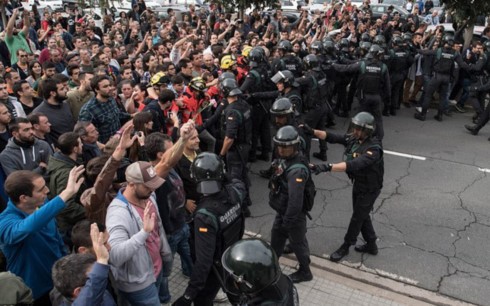(VOVWORLD) -
Preliminary results of Catalonia’s referendum have shown 90% in favour of independence. Although the referendum is widely considered unconstitutional and invalid, Catalonia’s wish to leave Spain has created division and political instability in Spain. The seeds of separation could spread to other EU countries and threaten the bloc’s unity.
 Demonstration in Spain (photo: Getty) Demonstration in Spain (photo: Getty)
|
More than 2.2 million out of 5.3 million registered voters cast their ballots in Sunday’s referendum and 90% of them voted for independence. 8% rejected independence and the rest of the ballots were blank or void. Although the Spanish Constitutional Court rejected the referendum and the central government vowed to stop it, the result clearly showed that Catalan people wish to be independent.
Risk of a long-lasting political crisis
The referendum in Catalonia was darkened by violence. From the beginning, the central government said it would do everything it could to prevent the illegal referendum. Tens of thousands of people demonstrated to support the referendum. They raised high their flag of separation and formed lines of defense around polling stations. At least 840 people were injured in clashes with police during the referendum.
Catalan leaders criticized the Spanish police and said the referendum result will be sent to the Catalan parliament. The Spanish government has vowed to protect Spanish unity. Prosecutors are considering charging Catalan leaders with crimes for opening voting booths at schools and public agencies. Tension between the central and local administrations could be worsen and spark a political crisis in Spain.
The cause of separation
Catalonia is one of the most developed industrial regions in Spain’s northeast. It comprises Barcelona, Girona, Lleida, and Tarragon. With a population of 7.5 million and a dynamic economy beside the Mediterranean Sea, Catalonia has a GDP of 300 billion USD, 20% of Spain’s total GDP and 25% of Spain’s export revenue.
In recent years, Spain has experienced deep economic recession. Budget deficit and unemployment have been high. The Catalan administration has not accepted the EU and the Eurozone’s austerity requests. Catalonia has to share the EU’s financial burden and immigrant quotas. Its people rejected a decision by the Spain’s Constitutional Court 7 years ago which removed or revised some of Catalonia’s autonomous rights.
Impacting the EU’s security and prosperity
Catalonia’s referendum was illegal according to Spanish law, which says only the central government has the right to organize a referendum. EU law does not support a referendum in Catalonia.
But after this referendum, Spain will have to try to reconcile interests to stabilize the situation. EU leaders will have to consider measures to manage growing separatist movements in several member countries. Spain’s crisis could spark movements in other places like the French island of Corsica, Italy’s northern developed industrial regions, Belgium’s Flanders and Wallonia regions, and Denmark’s Faroe islands.